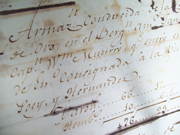Thu 1 Apr, 2010
U.S. family finds traces of slave-trade past in Cuba
Comments (6) Filed under: HistoryTags: Cuba, James D'Wolf, Katrina Browne, Madruga, Schooner Amistad, Slave trade, Traces of the Trade
 As I returned to the U.S. from Havana last night, the Associated Press released a story on our visit, “US family finds traces of slave-trade past in Cuba.”
As I returned to the U.S. from Havana last night, the Associated Press released a story on our visit, “US family finds traces of slave-trade past in Cuba.”
The article has been running prominently in the U.S. and abroad, making the A.P.’s daily top stories list as their third-listed international story in the world.
I spent ten days in Cuba with Katrina Browne and Tulaine Marshall, and the article focuses on our visit Sunday to the site of the Mount Hope coffee plantation owned by my fifth-great grandfather, James D’Wolf.
The article, written by the A.P.’s Will Weissert, is quite impressive, and I’m particularly pleased with the way it ends:
While both she and Perry have worked to uncover their family’s role, they say no Americans – even those whose descendants came to the U.S. after slavery was abolished – should feel unaffected. The early U.S. economy so relied on slavery that it fueled a boom, making America an attractive destination for immigrants ….
“None of us,” Perry said, “are untouched by the legacy of slavery today.”
This family history raises a wide variety of historical and contemporary issues, but in the context of Cuba, I think it’s particularly important to emphasize that the U.S. since colonial times has been tightly bound by economic and cultural ties to its neighbors in Cuba and elsewhere in the Caribbean. The U.S. owed its political and economic fortunes prior to the Civil War to its role in the transatlantic slave trade and to slavery, both domestic and foreign, and this history has played a vital role in our subsequent economic and social development.
In addition to owning slave plantations in Cuba, James D’Wolf was the leading slave trader in U.S. history, sending the majority of his slaving voyages to Havana. Our trip to Cuba, in conjunction with the visit of the schooner Amistad, included a variety of talks and other public appearances, the Cuban premiere of our documentary, Traces of the Trade: A Story from the Deep North, and conversations with scholars and archivists about further research into the history of the D’Wolfs and the U.S.-Cuban slave trade.
This blog has been on hiatus while I’ve traveling in Cuba, but you can see updates, photos, and videos from the trip on Facebook and Twitter.
Tweets that mention U.S. family finds traces of slave-trade past in Cuba | The Living Consequences -- Topsy.com says:
[…] This post was mentioned on Twitter by Tracing Center, James DeWolf Perry. James DeWolf Perry said: Prominent A.P. story about our trip to Cuba in connection with our slave-trading ancestors: http://shar.es/mrTjp […]
Tracing Center » A.P. story on Tracing Center visit to Cuba says:
[…] For more on the A.P. story and the visit to Cuba, see Perry’s blog, The Living Consequences. […]
Traces of the Trade » A.P. story on Traces participants in Cuba says:
[…] For more on the A.P. story and the visit to Cuba, see Perry’s blog, The Living Consequences. […]
ZSun-nee Matema says:
I have had the pleasure of meeting two of the Dewolf descendants. As a World History Instructor, I have shared the film, "Traces of the Trade: A Story of the Deep North", with my students. Their insistence in sharing their feelings about the DeWolf film tells me that hearing from descendants of the enlavers, in addition to those of the enslaved, maintains a healthy dialogue. I am pleased to see that DeWolf family members have returned to Cuba. I am making healing conversation around the issues of slavery, a priority. Many thanks to the DeWolf family for keeping this issue on the table.
@MLK6411 says:
They are lairs they knew that we were all over Cuba
James DeWolf Perry says:
Can you explain who are liars, and who was all over Cuba? As you can see, this blog post is clear about the extent of slavery in Cuba, as well as the role of the DeWolf family in bringing enslaved Africans to Cuba and in exploiting slave labor there. Our film, "Traces of the Trade," and our programs through the Tracing Center, go to great pains to explore the same historical issues in more depth. I'm just not sure what you think we, or someone else referred to here, isn't being honest about.